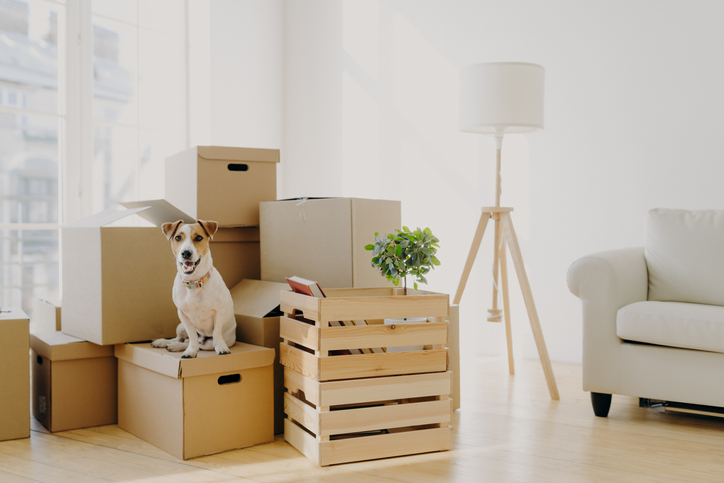Moving home can be one of the most stressful events in your life, especially if it’s your first time, if you have children and of course, pets. Moving furniture and other items is a breeze compared to moving things that have a mind of their own. With any big event, the best thing to do to relieve stress is to prepare and plan as much as possible. So whilst you’re organising movers, packing boxes and taking trips to the dump, if you have pets then it’s best to start getting a plan in place for them on moving day too.
Packing up
Most pets these days come with a lot of baggage, from mounds of toys, cages, carriers, beds, and blankets. So when you’re packing up your home, you’ll need to include all of your pet’s belongings too. Keep a separate box, or two, for them and mark the box accordingly. Decide what items they need every day and can’t be packed, and which items you’ll need on moving day itself to help you transport them. If they’re going to stay with a friend or family member, write a list of the things they’ll need for a few days – but only the essentials! Remember to include plenty of food and treats too.
Transportation
Of course, how you transport your pet depends on what pet you have – some are much easier to move than others. For example, smaller pets like hamsters and guinea pigs can be kept in their cages and as long as they have plenty of food and water, can be moved relatively easily but make sure they are one of the last things to move and keep them with you in the car. Fish are a bit trickier as they’ll need to be removed from their tank safely, and possibly stored in a smaller tank to transport on the day. Rabbits, although their hutches can be larger to move, can be transported in a carrier on the day. If you can, make sure they have space to run about when you arrive at your new home. Somewhere that is secure too so that they don’t end up in your new neighbour’s garden. Like rabbits, cats and small dogs can be moved in a carrier too. Or you might find they are more settled travelling in the car with you as they’ll be more familiar with that.
You’re likely to be travelling in your car along with some boxes, so make sure someone sits with your pet during the journey.
Alternatively, if you can find someone to look after your pet on the day or even for a few days, this might be better – especially for nervous pets.
Arriving at your new home
When you arrive at your new home, it’s important to ensure your pet is settled first before you start unloading boxes. Get them some water and snacks if they’ve been travelling for a long time and make sure they know where they can go to the toilet. Keep their beds and cages to hand, packing them into the car or van last so they can be picked out first. If they have any blankets or favourite toys, make sure they have them close by, so they have something familiar in the new surroundings.
Taking the dog for a walk is a great opportunity, or excuse, to take a short break from all of the unpacking. This is your first chance to get your dog familiar with its new walking route and can be a great way to chat to your neighbours.
Check on your other pets too, let the cat out in the garden, let the rabbits run about and count the fish again!
Settling in
Don’t worry if your pet seems off for a couple of days after the move. Like you, they’re settling into a new home and a new routine. They may be a bit wary of smells around the home and it will take a while for them to feel like it’s theirs. If you have a favourite candle or scent that you used in your old home then use it again in the new home, it’ll give them a recognisable scent. Avoid cleaning their bed and blanket as soon as you arrive as the older scent will be comforting to them. If you do need to wash it then stick to the same fabric conditioner. Sometimes pets can be put off their food for a day or so but if it continues then contact your vet for some advice.
Most importantly, show them plenty of love and cuddles.
Are you looking for a new home for you and your pet? Search the best properties for sale and to rent in Scotland at s1homes.com



















